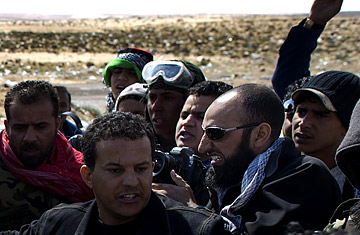
A photographer stands among Libyan rebel fighters between the towns of Ajdabiyah and Brega on April 9, 2011
As the push to overthrow Muammar Gaddafi has stalled, journalists have increasingly borne the brunt of the frustrations of Libya's rebels. Although the foreign press was eagerly welcomed just months ago, reporters in rebel-controlled areas have recently been harassed and intimidated. Officials of the rebel-led National Transitional Council (NTC) have steadily begun to treat correspondents as hostile elements: some have been prohibited from filming bomb scenes; others have been accused of being spies.
In several incidents in the months following the February uprising against Gaddafi, rebels have prevented journalists from recording events they consider embarrassing. For example, when a skirmish erupted in March after one fighter ordered another to stop firing an antiaircraft gun outside the town of Brega, which is about 130 miles (210 km) west of the rebel capital, Benghazi, other rebels kept correspondents from filming the incident. On another occasion, journalists were prevented from photographing a rebel who accidentally shot himself in April near Ajdabiyah, approximately 95 miles (155 km) west of Benghazi.
In Benghazi, reporters face similar restrictions. In April, a man barged into a press conference featuring the rebels' military chief of staff, Abd al-Fattah Yunis, and accused the former Gaddafi loyalist of persecuting the Libyan people for 40 years. After the intruder was rushed from the conference hall, journalists were barred from following him and were forced to remain in the room. In June, rebels prevented reporters from filming a car that exploded in a hotel parking lot in Benghazi.
In recent weeks the NTC has intensified pressure on journalists, with most of the intimidation occurring in the rebel enclave of Misratah, 117 miles (188 km) from Tripoli, the capital. Officials there accused reporters of being "spies" and working for "outside powers." They prevented journalists from traveling to the front and began vetting them, even though the reporters had already registered with the NTC Media Center in Benghazi and had been approved to work in all rebel-controlled areas of Libya. Suspicion has fallen particularly heavily on those correspondents from non-English-speaking countries, because Misratah's officials cannot read their foreign-language articles on the Internet. A Polish correspondent was accused of not being a "real" journalist because he took a number of pictures and no one there could understand his published pieces.
Officials in Misratah have stipulated that foreign correspondents can use only "approved" translators, a condition the NTC has not imposed in other areas under its control. In addition, journalists are being hassled about the subject of their articles. In June, one correspondent asked a media official to help arrange meetings with prisoners captured from Gaddafi's forces; the official chastised him and suggested that he instead visit civilian amputees wounded by Gaddafi fighters. When asked why he was muzzling coverage, the official responded, "I am the new Gaddafi! I control everything here!" Another writer was accused of being a spy because his questions had vexed a Misratah official.
Some NTC officials sought to discount events in Misratah by blaming battlefield conditions. "There is paranoia in Misratah because Gaddafi is making a serious push lately," explains Jalal al-Galal, the council's media-committee spokesman. "When Misratis become agitated, they lash out at the first target they find, and that is foreigners."
Privately, NTC officials concede that the actions of their counterparts in Misratah are somewhat justified. "We can't discount that Gaddafi has spies operating in our midst," says a military official who spoke on condition of anonymity. "We have an open environment where people come and go. And being a journalist affords the best cover to provide information." The rebels have already apprehended foreigners they believe were working for Gaddafi. In May they detained a group of French security contractors, claiming they were relaying military information to Gaddafi's forces in Tripoli.
Others, however, believe the problem lies with Libyans' unfamiliarity with Western journalistic standards. "Many here just don't understand how journalists behave," says Salah al-Senoussi, a professor of political science. "We never had a free media. For the last 40 years, the papers and television have been telling us how great our political system was, and no journalists ever challenged this farce. This is the legacy of Gaddafi. When journalists challenge the politicians, they believe there is some hidden agenda. Journalists are seen as enemies because they want information politicians don't want to give up."
And with Western reporters eager to learn why the rebels are faltering at the front and how they plan to resolve the dilemma, the NTC's frustrations with journalists are not likely to subside anytime soon.
